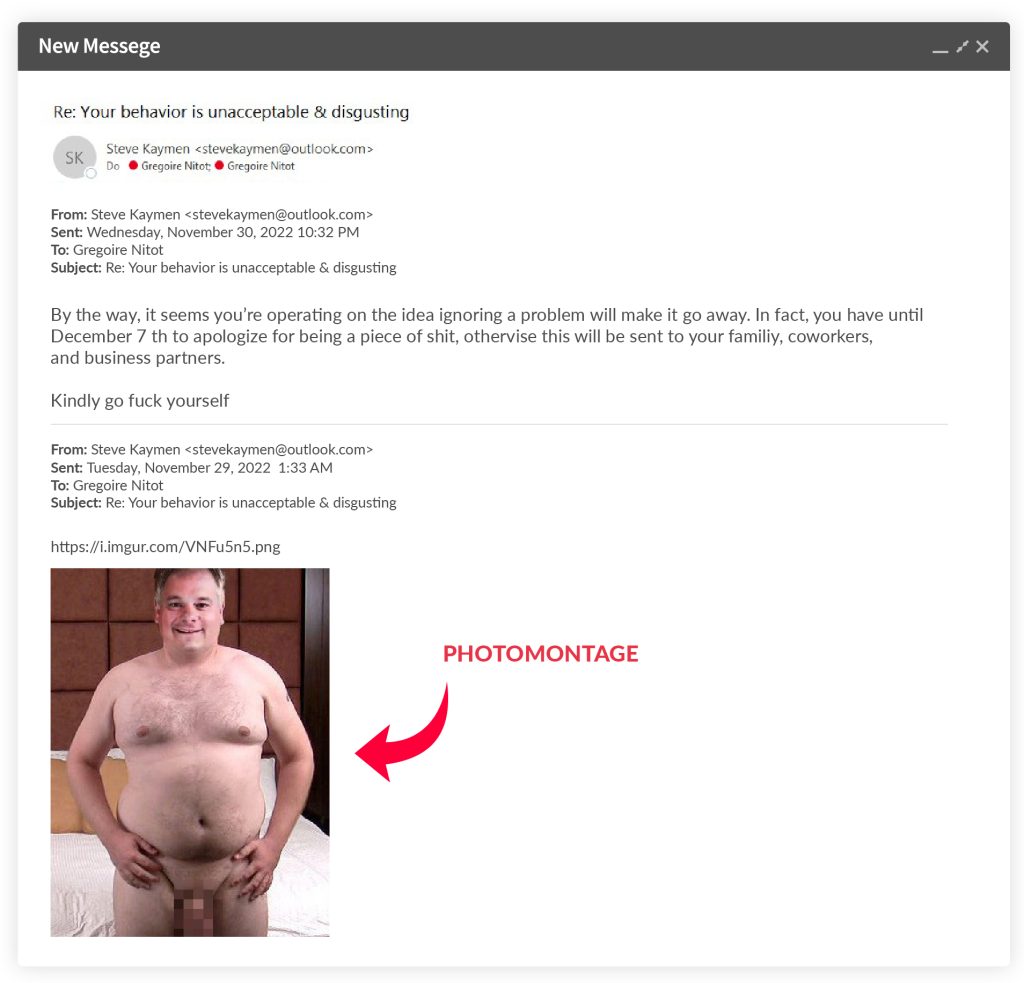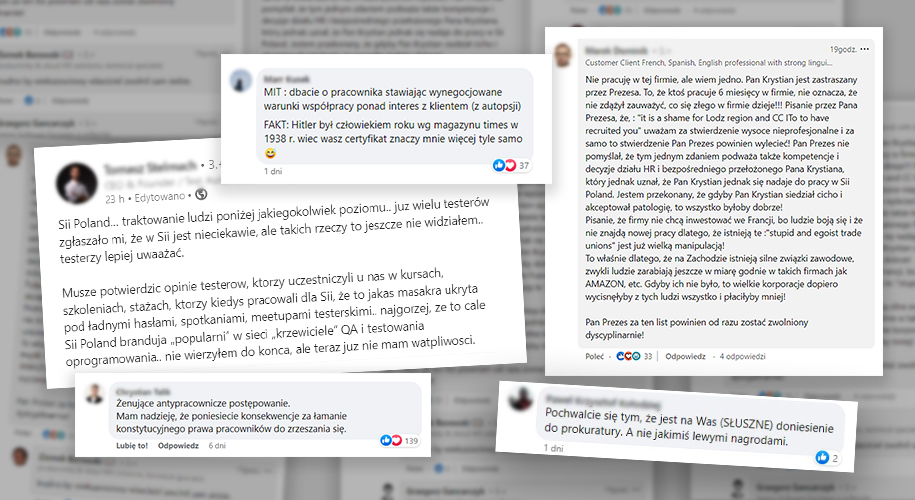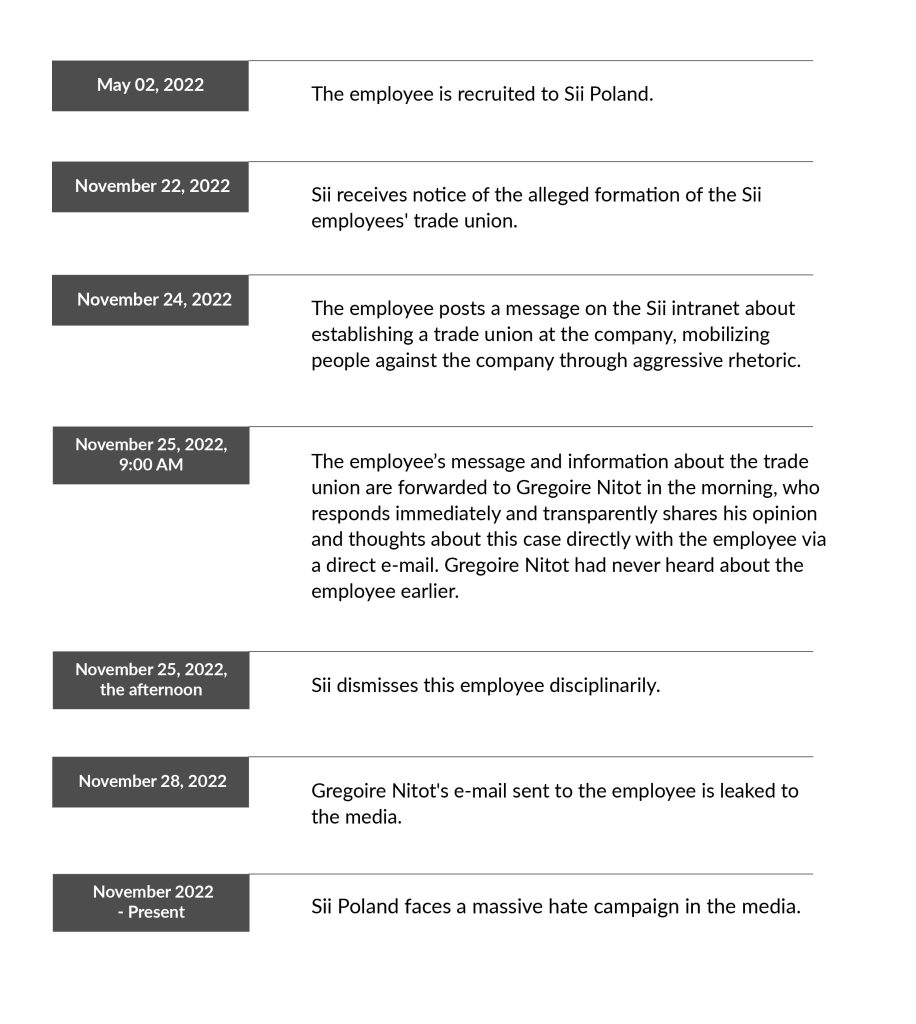In November 2022, news about dismissing a self-proclaimed union representative of the trade union Związkowa Alternatywa from Sii Poland hit the media headlines. Hundreds of articles and social media posts presented shocking information about our company. We have become victims of aggressive actions of a group driven by political motives, with solid connections in the media. In the article, I’ll present the truth about this dismissal and my thoughts on trade unions and their impact on companies, workers, and citizens from an entrepreneur’s perspective.
(Kliknij tutaj, żeby przeczytać artykuł po polsku.)
In the introduction, I want to firmly declare that I’m not against trade unions and I don’t discriminate against people because of their political views. I’m fond of Liberty — it’s one of my core values. I admire the Polish trade union Solidarność, led by Lech Wałęsa which played a crucial role in Poland in the 70s and 80s in fighting against oppressive policies of the communist government and became a symbol of resistance against the authoritarian regime.
Trade unions are beneficial when their representatives have basic economic knowledge and realize that the goal and huge challenge of any company isn’t just to satisfy employees but also:
- To secure the company’s long-term financial sustainability and profitability.
- To provide competitive products and services at an affordable cost to its customers (or, in the case of public institutions — efficient public services for citizens).
- To maintain a competitive advantage — if we offer too high remuneration and a too expensive benefits package to our employees, we’ll lose an advantage over our competitors, who don’t provide such extra compensation and can offer lower prices to their customers. Consequently, we would lose customers, which, in the end, has a negative impact on our employees. Worse financial results lead to fewer investments, dismissals, and worse working conditions for our employees.
Unfortunately, some trade union members have no idea about these challenges and focus solely on the private benefits, privileges of being a trade unionist and protection of their members — and this is an attitude I strongly oppose. Unlike entrepreneurs, they don’t care about the company’s financial sustainability, competitiveness, or customer interest, and yet the employee satisfaction they claim to be fighting for is not possible without the success of the company.
Not only that — they are sometimes even determined to destroy their employers and fight capitalism, as exemplified by the statement of the former Vice President of the Związkowa Alternatywa trade union, Monika Żelazik, in Piotr Szumlewicz’s, the leader of Związkowa Alternatywa, podcast — Czas na Związki [own translation]:
“We started to wonder with Piotr [author’s note: Szumlewicz] whether it wouldn’t be really justified to burn down the workplace or perhaps to puke on such a CEO. […] Don’t just write anything on Facebook, but, you know, we’re gathering forces […].”
I emphasize once again that the reason for the former employee’s dismissal was not an attempt to establish a trade union at Sii but rather his toxic behavior towards the company, which, as presented above, is also characteristic of other members of Związkowa Alternatywa.
However, before I delve into the detailed presentation of the arguments in favor of the employee’s dismissal, I’d like to demonstrate the working conditions that Sii offers and the company’s situation when the event occurred.
Sii Poland’s story and situation in November 2022
In January 2006, I established Sii Poland as a one-person start-up operating from my small Warsaw flat. However, by November 2022, the company has become a leader in Poland’s IT, engineering, and BPO services sector, employing 7 700 people in 15 regional branches in Poland and generating PLN 1.9 BN in revenue.
Our achievements include being titled a “Great Place to Work” for nine years in a row and being ranked as the second-best employer in Poland in 2023. This certificate is awarded based on anonymous surveys and demonstrates that employees are genuinely satisfied working at Sii.
Part 1: Związkowa Alternatywa’s attack on Sii
Timeline and reasons for the employee’s dismissal
The company was thriving when suddenly, in November 2022, it came to light that an employee who had joined the company only six months earlier had been inciting others against the management, questioning his own salary that he had already accepted before starting the job and lying about the working conditions at Sii. All these actions had a negative impact on colleagues and caused their distress.
Here’s the timeline of events leading to the said employee’s dismissal:
The employee’s true motives and circumstances leading to the dismissal
The employee’s behavior gave us every reason to name him a troublemaker. What does this term mean?
- It is an individual known for inciting discord and conflicts, motivated to degrade the atmosphere within the team.
- Troublemakers enjoy causing problems, conflicts, and arguments, especially by provoking others to oppose authority.
- They deliberately spread anxiety and worry, usually through gossip, bullying, and harassment, to disrupt the workplace.
- They have a bad influence over colleagues, aiming to demotivate people who were initially happy to work at the company.
- Dealing with troublemakers is frustrating and upsetting to everyone, particularly their managers.
The only effective way to deal with troublemakers is to dismiss them — for the good of the company and its employees.
The employee, who turned out to be a troublemaker at Sii, is associated with Marxist-minded circles and supported by the leader of Związkowa Alternatywa. Together with Piotr Szumlewicz, they are more focused on destroying companies like Sii than on securing employees’ jobs and addressing their real needs. They are known for being openly against and trying to block B2B and freelance contracts, even though most IT specialists prefer this form of collaboration.
Their actions are driven by personal goals, such as ensuring protection from dismissal, acquiring substantial compensations from former employers, gaining publicity and recognition, and expanding the electorate for far-left politicians from, for instance, Partia Razem. They have a well-exercised strategy. They pursue their egoistic aims by attacking the reputation of companies like Sii — driving biased media coverage and increased interest from state institutions. In our case, they contacted various entities, such as the Ministry of Funds and Regional Policy (KPK OECD), the Ministry of Justice, the Prosecutor’s Office, and even directly Sii’s clients. Due to their actions, Sii underwent an increased number of audits and inspections, including the National Labor Inspectorate audit initiated by Adrian Zandberg (the leader of the party mentioned above, Partia Razem).
All of these actions have badly affected Sii and its 7 700 employees. Therefore, I can firmly state that the goal of Związkowa Alternatywa is not the well-being of thousands of people at Sii or increasing the company’s competitiveness and financial stability but only harming us.
Związek Zawodowy Pracowników Sii trade union’s existence questioned
The existence of the Związek Zawodowy Pracowników Sii trade union, established on behalf of Związkowa Alternatywa, has never been confirmed. Representatives of Związkowa Alternatywa have not submitted any documentation proving a successful registration nor the required membership of at least 10 employees, a minimum necessary to establish a union. We rely solely on their declarations that this alleged union has 15 members, which is only 0.2% of Sii’s 7 700 employees…! Even if this union existed, which we doubt, it’s clear that it wouldn’t represent the needs of the majority of our employees.
Not only is the union’s existence questionable, but we also have grounds to question the ex-employee’s role in it. No documents verifying his status as a chairman have been provided to us. Our doubts are also reinforced by the fact that none of Sii’s employees chose to testify against the company in court.
Negative impact of the employee and Piotr Szumlewicz’s actions on employee morale and Sii Poland
Overnight, Sii faced bad press and reputation problems, which concerned thousands of employees. Suddenly, a company they value and enjoy working for but also themselves became targets of a hate campaign. They expressed this repeatedly during their annual interviews:
- “It was difficult to observe how the issue with the trade unions had such a massive impact on our reputation.”
- “The scandal with the union. I have always been proud to work at Sii, and this situation saddened me a bit.”
- “The recent situation in the company is demotivating for the overall work environment.”
- “The situation with the trade union greatly saddened me. I was bothered by the fact that the company I work for became the subject of such negative opinions.”
The media uproar was fueled by posts about Sii on social media, blogs, and private emails. Concern was amplified by questions about the situation that employees received from their families and friends.
This attack targeted not only the company but also individual Sii employees, slandering their good name — experienced explicitly by the Line Manager of the employee in question.
The media campaign against Sii driven by Związkowa Alternatywa affected also some of our clients, who afraid about their own reputation, decided to stop some of our contracts. This had a negative impact on our workers.
Związkowa Alternatywa’s supporters and their hatred against me
From the very beginning, I’ve been the primary target of Związkowa Alternatywa’s hatred. The extent of the slander directed towards me is immense — in articles, posts, and comments. I also receive private messages and emails with threats. Below, you’ll find the proof.

Not even my family was spared. My wife has received aggressive messages about how she could be with such a despicable person like me. Despite her lack of direct involvement in the issue, she’s facing hate speech completely unjustly.
Związkowa Alternatywa behind the massive media campaign against Sii
The troublemaker’s and Szumlewicz’s fight against Sii is ruthless and dishonest — manipulation, defamation, and spreading unverified information about the company in the media are their standard practices. Within just a few weeks, they managed to generate hundreds of publications. Here are some examples:
- Prezes Sii Polska i właściciel Polonii Warszawa bezprawnie zwalnia naszego związkowca, lekceważy polskie prawo, atakuje prawo francuskie
- Dyscyplinarka za założenie związku. Zwolniony pracownik Sii zdradza, jakie podejmie kroki
- Chciał założyć związek zawodowy w IT. “To jest odrażające, wstyd dla całej Łodzi”
- Wyczyn szefa. Pokazał, jak zwalniać pracowników w januszeksie [PRAWDA]
- Prezes pozwany za wysyłanie nagiego zdjęcia związkowcom – ciąg dalszy afery w Sii
- Zwolnienia w gigancie IT? Związkowcy pytają o skalę. Sii Polska: To naturalna rotacja
- “To wstyd, że cię zatrudniliśmy”. Francuski prezes polskiej firmy bezprawnie zwolnił związkowca
- W IT nie ma miejsca dla związków zawodowych. Zrozumiano? Rozejść się!
- Lekcja pogardy dla polskiego pracownika
- Po zwolnieniu szefa związku zawodowego będzie kontrola inspekcji pracy w Sii Polska
- Rynek pracy oczami zwolnionego za członkostwo w związku zawodowym (podcast)
- Kto szantażuje prezesa nagimi zdjęciami? Afera w informatycznym gigancie
- Miażdżąca ocena działań Sii Polska przez Państwową Inspekcję Pracy!
Examples of the trade union’s absurd rhetoric:

Examples of social media reactions involving public figures:


Examples of social media backlash with hate:

It’s worth emphasizing that most of these publications come from the media with which Szumlewicz, as an active journalist, has solid connections. These media outlets not only fall for his manipulations, presenting an extremely biased view of the matter, but also violate basic standards of journalistic ethics.
A prime example is Gazeta Wyborcza in Łódź, which published most nationwide articles about the case between Związkowa Alternatywa and Sii. They’re consistently written by the same person who reproduces a one-sided narrative and demonstrates a lack of integrity by failing to verify the accuracy of information and manipulating the message. We are shocked that the media such respected and well-known happen to forget their real mission, which is to serve the truth.
Another source of media noise comes from low-reach online portals. Desperate for ways to increase their audience, they focus solely on creating flashy headlines that are taken out of context and don’t reflect the truth. Związkowa Alternatywa relies on such sources, spreading negative information about Sii on their social media.
Part 2: Trade unions vs. company management — an entrepreneur’s perspective
Who is really on the side of employees and society’s well-being?
Every company manager faces the difficult task of simultaneously achieving four strategic goals, namely:
Balancing the 4 strategic objectives is challenging because they compete against each other. It can be explained simply:
- Workers expect higher remuneration and more benefits to get satisfied, which is against profit.
- Customers expect lower rates and better quality of products and services to be satisfied, which is against profit.
- Growth and winning against competition require investment, which is against profit.
Generating profit and maintaining financial stability is the primary and most challenging goal to achieve for any private company in the world, like Sii. It stands in contradiction to the other three goals, but at the same time, it is necessary to ensure employee and customer satisfaction and investment. A company that doesn’t generate any profit but generates financial losses must reduce costs to avoid bankruptcy. It can do it by:
- Decreasing employment costs through reduced employment or remuneration cuts, which is against employee satisfaction.
- Lowering the quality of services offered to customers, which is against customers’ satisfaction.
- Limiting or even stopping investment, which is against company growth, and new job creation.
Effective leaders must balance all these simultaneously, making the best compromise between the 4 strategic objectives that are contradictory (and a tough challenge to achieve!). Profit enables companies to invest, grow, recruit new people, and provide extra employee benefits, contributing to a more satisfied workforce. Radical left-wing trade unions don’t care about profit generation, client satisfaction, or winning over competition.
Let’s compare the impact of entrepreneurs versus some trade unionions:
| Entrepreneurs like Gregoire Nitot | Trade unions controlled by radicals, such as the Związkowa Alternatywa |
|---|---|
| Impact on Sii, job creation, care, and development of employees | |
|
Without me, as the company’s founder, there would be no Sii in Poland, which means 7 700 employees wouldn’t have jobs at Sii. Entrepreneurs like me create new businesses and hire employees, generate new job opportunities, and increase the overall employment rate in the country. They care about employee satisfaction to retain the best workforce. As a CEO, I have direct contact with thousands of Sii employees every year to listen to their critics and change proposals via:
I tremendously care about employee satisfaction. I’ve implemented hundreds of initiatives since 2006 to improve the employee experience. My concern for employees is proven by the following:
|
Don’t create any jobs or hire anybody. On the opposite, they destroy jobs and workers’ satisfaction by damaging the company’s reputation, creating a hostile workplace atmosphere, lowering profits, and impeding growth. In the case of Sii, they:
|
| Influence on society’s well-being and social progress | |
|
Explanation: France is a good example of how aggressive trade unions (such as the CGT), complicated labor laws, and excessive layoff protections discourage multinational companies and entrepreneurs from creating jobs. Entrepreneurs in France fear they won’t be able to dismiss toxic troublemakers and underperforming employees or cut costs during an economic crisis. So, they are reluctant to invest and create new jobs. This, in turn, leads to fewer job openings and weakens employees’ negotiation power with their managers, as fewer jobs are available on the market. When an employee is not afraid to resign because there are many vacancies available on the market, they have much stronger negotiation power with their employer to get, for example, a pay increase. |
Unrealistic trade union demands and their consequences
Here, I’d like to share my thoughts on typical trade union demands, namely:
- Protection against dismissals;
- Promotion policy based on job seniority (not worker skills, attitude, and performance);
- Salary increases higher than inflation.
I believe implementing these three demands would negatively affect companies, workers, and citizens and make no sense from an economic point of view. Below are my explanations as to why:
| Business impact | Commentary |
|---|---|
| Protection against dismissals | |
|
Trade unions try to restrain the power of companies to dismiss their workers. This can lead to:
|
Trade union members are often focused solely on their benefit and prioritize self-protection over the overall welfare of their workplace. They try to shield their members from dismissals, even though those employees perform below expectations or are toxic troublemakers. Dismissing an employee is a difficult decision, but in 3 cases, it is necessary for the company’s healthy operations, its performance, and the well-being of the rest of the team. Managers should dismiss when they’re dealing with:
|
| Promotion policy based on job seniority | |
|
Promotions based on job seniority – consequences:
|
Trade unions request remuneration and promotion based on seniority, not employee performance and attitude. At the same time, a shorter-serving employee can be better than a longer-serving one (because they’re more committed, have a better attitude and skills, etc.). To treat employees fairly and attract the best talent, their performance must translate into compensation and recognition. “Power People: to identify and promote the best employees” is Sii’s mission. One of the critical elements of its implementation is the remuneration policy. Effective remuneration policies should include the following:
Managers must make a clear and fair differentation between top and low performers. They should offer higher remuneration and reward to the best to recognize, motivate and promote them. Given the above, companies should not be forced to automatically promote employees based on their seniority. |
| Salary increases higher than inflation | |
|
Offering systematic remuneration increases above inflation (or above our competitors) means that the company’s costs will be higher than its competitors’ costs. In turn, this creates a risk that customers will choose cheaper suppliers. Sii Poland faces global competition in the professional services industry, particularly from companies that operate on a large scale in India. Therefore, we should carefully balance remuneration increases to keep talent while maintaining customer-friendly rates. Otherwise, our customers will choose Indian suppliers instead of Sii Poland. Losing contracts results in cost-cutting measures, including staff reduction and layoffs due to the insufficient number of projects, which is against employees’ well-being. |
The self-appointed representative of Związkowa Alternatywa demanded an above-inflation wage increase for all 7 700 employees. If Sii were to meet this demand at Poland’s inflation rate of 17.3% in 2022, the company would face an additional cost of more than PLN 300 million and thus would record losses. Given such a scenario, Sii would have to lay off thousands of people to avoid bankruptcy and maintain financial stability. Imagine an equivalent situation in the public sector. If every civil servant received an above-inflation salary increase every year, this would result in a significant rise in the cost of public services and public administration spending, and thus a dangerous surge in the public debt and the need to sharply increase taxes for citizens to finance the increase in civil servants’ salaries above the rate of inflation. Advocating wage increases above the inflation rate demonstrates that people behind this demand often lack the basic economic knowledge to predict the long-term effects of its implementation. |
What to keep in mind while managing salaries
As I mentioned earlier, salary management is a complex task involving many factors. To summarize:
- Employee performance metrics, KPI, and ratings to determine each employee’s compensation based on their skills, efforts, and results. It is normal to offer higher remuneration to the best performers.
- The average salary for similar positions in the market to avoid overpaying or underpaying and to remain competitive.
- On the one hand, we must offer attractive remuneration to attract and keep talent in the company.
- But on the other hand, we shouldn’t offer excessively high remuneration, above the market average — otherwise, the company will incur higher costs than our competitors, which will be able to offer more attractive prices to customers, so to win with us.
- The salary calculation should include employee replaceability — recruitment, onboarding, and downtime. Sometimes, it is better to give a raise to avoid the risk of losing an employee who is difficult to replace.
- It is useless to give higher remuneration to a subordinate if we could replace this person with:
- Somebody better, more competent, or with a better attitude for the same remuneration or
- By somebody with similar competencies, skills, and attitude but at a lower remuneration.
- Fair remuneration for employees in similar positions and with similar performance. This is necessary to avoid dissatisfaction, jealousy, and conflict, as well as to maintain a good atmosphere, motivation, and commitment at work.
For instance, if an employee has excellent performance and attitude, consistently exceeds all KPI, and delivers above expectations, we should give them a raise above the market average and a huge recognition.
To conclude, I again emphasize that a smart approach to salary management is critical to fostering motivation, retaining talent, and ensuring the company’s financial health and competitive edge.
My appeal to the authorities on radical trade unions
Trade unions such as Związkowa Alternatywa, which only seemingly care for the welfare of employees, hurt public and private organizations by making them less competitive. Additionally, their presence in a company forces redundant work and expenses, such as giving them office space and holding regular board meetings with union officials, even if they don’t actually bring any value to the employer, especially since they often lack any competence to manage companies.
The presence of radical unions makes it difficult for companies and public institutions to make changes and improvements, be agile in business, minimize bureaucracy, and increase productivity. They create additional bureaucracy, paperwork, prolong decision-making, and change implementation time.
The activities of far-left trade unions, such as Związkowa Alternatywa, are based on promoting populist phrases, e.g., demanding 2.5 times higher wages for work on Sundays and public holidays, which without deeper analysis are obviously very attractive and can attract many supporters.
Selected posts by Związkowa Alternatywa about 2.5 times higher wages for work on Sundays and public holidays:

Making such promises is easy for Szumlewicz because he doesn’t have to find the funds for them and face the consequences of their implementation. So, who will pay for these expenses — customers by paying higher prices or citizens through tax increases?
- Will bread, dishes in restaurants, public transportation, or football match tickets be 2.5 times more expensive on Sundays?
- Or will we, citizens, pay higher taxes?
The conclusion is obvious. Szumlewicz’s demands are irrational, unreasonable, and likely to have negative consequences for the well-being of the majority of citizens.
Therefore, my appeal to Polish and EU authorities is to stop protecting union leaders with such radical views. Special privileges should not be granted to radical trade unionists, thus removing company managers’ freedom to react to toxic troublemakers’ actions. What I object to is the amendment to the Act on Trade Unions, which gives them even more power. It may cause more abuses and discourage business owners from investing and recruiting people in Poland. Moreover, it threatens our labour market and economy and may lead to a deterioration in the quality of life of the majority of Polish workers.
Conclusion
I’m not against unions when they are run by people with a keen business sense who don’t focus only on employee benefits; but also customer satisfaction, competitiveness, and long-term financial stability of the company and don’t abuse the privileges granted by their trade union status for personal gain.
One of my core values is Liberty. Therefore, in my opinion, workers and citizens should always have the right to assemble and demonstrate their dissatisfaction if they feel that their workplace or country is being badly or unfairly managed.
Anyway, if you aren’t satisfied with your remuneration, your manager, or the conditions your company provides and you think you can get a better job elsewhere — resign!
After all, no company wants to lose good employees. So, companies need to raise salaries and improve working conditions if they suffer from too frequent resignations of good professionals and cannot recruit new people because the salaries they offer are too low.
However, if the company faces a toxic troublemaker or an employee who performs poorly, union membership should not guarantee protection from dismissal. The choice of what to do with such a person must rest with the manager, who is in the best position to make the most beneficial decision for the company.
In my opinion, one should not support a person with radical views. With the populist language they use, their demands may seem appealing, but their implementation threatens social stability. By ostensibly advocating equality, they create privileged groups that do not always benefit and can even be harmful. This highlights the importance of supporting entrepreneurs whose actions have a positive impact on both workers and society.
Polish and EU authorities should stop unreflectively protecting union leaders. Companies in Poland and the EU may thus become less competitive in relation to countries offering favorable conditions for businesses. Dear authorities, be mindful of whom you’re protecting.
And now comes the ultimate absurdity — the former employee demands to return to Sii. At the same time, he slanders his colleagues and manager. He demands to be reinstated in his previous position yet publicly criticizes Sii’s management and salary. He claims that he wants to be part of the company again but contradicts all our values and tries to ruin the company with his actions.
This begs the question — what makes him want to return to Sii? The colleagues he doesn’t respect, the company he is battling against, or the management he hates? Or maybe he doesn’t want to return at all, and something else is at stake… Unfortunately, Polish laws protecting trade unionists allow him to play this ruthless game. The possible grand prize? An enormous (and unfair!) cash infusion for withdrawing the court case. There’s plenty to fight for, even if the loss of morality is at stake.
To our former employee and Mr. Szumlewicz — if you genuinely want to improve the social situation and positively impact the Polish labor market and well-being of employees, take meaningful action. Instead of spreading populist slogans and destroying companies like Sii, become entrepreneurs like me. By starting a company, working hard each day to attract customers, grow your business, create jobs, and take care of your employees, you can contribute to change. I’ve successfully achieved this — at Sii, Tawerna Kaszubska, and Polonia Warszawa. Try to do the same!



Leave a comment